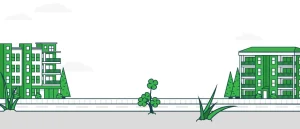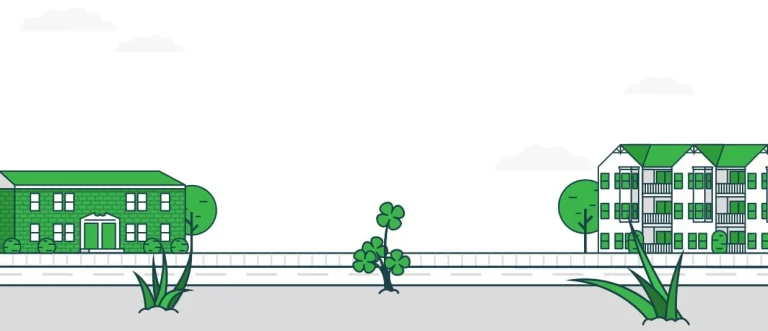North Carolina is a beautiful and diverse state. Whether you own a condo on the blissful Atlantic coast, near the scenic Appalachian mountains, or in the bustling Research Triangle near the state’s center, you need condo insurance to protect your property.
Navigating the insurance market can be tricky with so many options available and possible requirements to consider. We made this informative guide so you don’t have to stress about finding the right coverage. We break down average rates, cost factors, and more.
Keep reading for help finding the best and cheapest condo insurance in North Carolina.
How Much Is Condo Insurance in North Carolina?
North Carolina condo insurance costs about $487 yearly or $41 per month, with rates ranging from $31 to $77 monthly, depending on coverage amounts.
Insurance companies analyze several variables to determine premiums. As a result, premiums vary by location. Some areas may be cheaper or more expensive than others due to possible property damage risks.
North Carolina’s location means it’s possible to experience hurricanes, earthquakes, and serious winter weather, depending on where you are in the state. These all affect insurance costs. Look below at average condo insurance rates in North Carolina, classified by coverage amounts.
| City | Avg. Annual Rate | Avg. Monthly Rate |
|---|---|---|
| $20,000 to $49,999 | $372 | $31 |
| $50,000 to $74,999 | $489 | $41 |
| $75,000 to $99,999 | $587 | $49 |
| $100,000 and over | $923 | $77 |
You’ll experience higher premiums if you require higher limits. However, condo insurance costs are consistently lower than homeowners insurance since condo owners are responsible for insuring only their units. In contrast, homeowners must cover their whole home structure and other aspects of their property, like their yards and driveways.

A Simpler Way to Get Condo Insurance
Protect everything your condo association doesn’t with a custom condo insurance policy at an affordable price.
What Does Condo Insurance in North Carolina Cover?
Condo insurance in North Carolina protects your personal property, liability, and some features of your unit from various causes of possible damage. Damage sources are called perils, and some commonly covered perils include theft, fire, water, and wind damage.
You’ll find distinct coverage areas in your condo insurance policy, typically outlined as follows:
Personal Property Coverage
Personal property coverage safeguards your belongings, like furniture, clothing, electronics, tools, small appliances, and more, from covered peril damage.
Loss of Use Coverage
Loss of use coverage reimburses you for additional living expenses if your condo becomes uninhabitable after covered peril damage. Your insurer can cover the costs of temporary lodging, groceries, and more.
Liability Coverage
Liability coverage provides financial protection if you’re found legally liable for injuring someone. Your provider can help cover medical expenses, legal fees, and more.
Medical Payments Coverage
Medical payments to others covers medical expenses if someone is injured at your property, regardless of fault. Medical payments has a much smaller limit than liability coverage and is meant to help with minor injuries only.
Loss Assessment Coverage
Loss assessment coverage covers your share of assessments made by your association for covered property damage or liability claims affecting common areas that exceed the association’s insurance policy limits.
Building Property (Dwelling) Coverage
Dwelling coverage protects many of the built-in features of your unit, like the flooring, counters, and cabinets, from covered perils
How to Get the Best Condo Insurance in North Carolina
You need to compare quotes to find the best condo insurance in North Carolina. To properly compare options, evaluate your coverage needs and budget so you have an idea of how much insurance you need. Then, you can shop around.
Know Your Master Policy
Part of knowing your coverage needs is identifying the gaps in your condo association’s master insurance policy. Typically, every condominium complex has a board or homeowners association (HOA). The HOA is in charge of governing the development.
HOAs have master insurance policies that cover building exteriors and common areas from damage. You help pay for the master policy through your HOA dues, which is part of the reason personal condo insurance policies are relatively cheap compared to homeowners insurance plans. Condo owners don’t need to insure their whole building – just their unit.
The limits of your HOA’s master policy affect your personal HO-6 insurance needs. There are generally two types of master plans: walls-out and walls-in policies. Walls-in policies cover the built-in features of your unit, like the countertops, flooring, and lighting fixtures, from covered peril damage. Walls-out HOA policies cover nothing in your unit.
With a walls-in HOA policy, you don’t need to be as concerned with dwelling coverage in your personal HO-6 condo insurance since the HOA covers fixtures in your unit for you, assuming the role of that dwelling coverage. However, if you have walls-in coverage, note if your master policy covers betterments and improvements you make or not.
If your complex has a walls-out master plan, you should pay close attention to dwelling coverage in your policy. Make sure you get an amount that covers the value of your interior features.
Know Actual Cash Value vs. Replacement Cost
You should also note how your policy covers losses. Insurance covers your belongings and some property damage at either actual cash value or replacement cost. This determines how much money you’re reimbursed in a claim.
Actual cash value coverage in insurance means your provider will subtract depreciation from damaged items before reimbursing you for them in a claim. This decreases the amount of money you’d receive, as everything that isn’t brand new will depreciate to some extent.
On the other hand, having replacement cost coverage means your carrier will give you back what you paid (or fair market value) for damaged items regardless of age.
Replacement cost coverage is preferable, but it’s also more costly. Note when actual cash value and replacement cost apply to losses in your plan and consider upgrading to replacement cost if it’s in your budget.
Have What You Need for a Quote
Once you know coverages and excursions, you’re ready to quote. To get a condo insurance quote in North Carolina, have the following information handy:
- Name, address, email address
- Square footage and floor of unit
- Number of floors and units in building
- Prior insurance history
In most cases, you’ll choose your desired limits and deductibles when you get a quote. You should also acknowledge your experience when quoting with different companies. In addition to observing different prices, you can see which providers have friendly customer service or helpful websites, which makes a difference when finding the best condo insurance in North Carolina.

A Simpler Way to Get Condo Insurance
Protect everything your condo association doesn’t with a custom condo insurance policy at an affordable price.
Tips on Getting the Cheapest Condo Insurance in North Carolina
On top of shopping around to find the best rate, there are some methods to lower your premiums for cheap condo insurance in North Carolina.
Adjust Your Policy Limits
When deciding on your policy limits, you’ll notice that raising your desired limits increases your premiums. You shouldn’t underinsure yourself, but you can avoid overpaying for coverage you don’t need.
Create a home inventory that notes all your items and their price tags. The grand total of your belongings is how much personal property coverage you should get.
For liability coverage, most people will make do with between $300,000 and $500,000 of coverage. We don’t recommend going for the minimum, typically a $100,000 limit, as this could fall short in a serious liability claim. You don’t want to be on the hook for possible medical bills and legal fees if you can avoid it.
Consider your need for dwelling and loss assessment coverage. If you need dwelling coverage, be sure to value your features properly. Loss assessment coverage is optional. If you know your HOA has high cash reserves or your condo isn’t at risk of any form of damage, you might be comfortable bypassing loss assessment coverage, which would save you money.
Raise Your Deductible
Raising your deductible lowers your premiums because it shifts a larger part of the risk and financial responsibility of property damage to you. With a higher deductible, you take on a greater share of the financial burden in a claim. This lowers the insurance company’s possible payout, so your carrier offers you lower premiums.
Factors Affecting North Carolina Condo Insurance Costs
Insurers analyze several factors to determine premiums for every policyholder. These factors affect your chances of property damage and how risky insuring your place is. More dangerous condo units have higher insurance premiums.
Some critical factors that affect the cost of condo insurance in North Carolina include:
- Location
- Policy details
- Building features
Condos near the coast will likely have higher rates since they’re more exposed to hurricane and flood damage. Owners in condos in earthquake-prone regions of the state may pay more for coverage, also.
As we discussed earlier, your coverage limits affect your premiums. Higher coverage limits, especially for your dwelling and personal property, will raise premiums. Additionally, raising or lowering your deductible will change premiums.
The age of your building matters. Older buildings often have higher premiums since they suffer from more wear and tear-related issues and may be more prone to damage. Also, older buildings may lack the best safety features like fire alarms and sprinkler systems, which makes the buildings riskier.
Is Condo Insurance Required in North Carolina?
While condo insurance in North Carolina isn’t required by law, mortgage lenders will require you to get a policy as part of a home loan. Also, some condo associations require residents to have personal condo insurance.
No matter what type of property they’re putting money down on. Lenders always require the property owner to get insurance. If you bought your condo with a mortgage, your lender would require you to keep condo insurance for the life of the loan. This protects their investment in your property.
Also, some condo associations require all residents to have HO-6 policies. This helps limit the liability of other residents and the condo board. Even if you’re not required to keep a plan, insurance coverage is always a good idea, especially when a sufficient policy can cost under $40 per month on a condominium.
How to Get North Carolina Condo Insurance Quotes
One of the best ways to get condo insurance quotes in North Carolina is with the help of an independent agency. At Clovered, you can quote online on your own time, or you can ask one of our licensed, in-house insurance agents for help with your policy.
As an independent insurance agency that operates in multiple states throughout the country, we can compare your information with our partner companies to find you a quote for the coverage you need at the price you want. Our team is also on standby to answer your questions at 833-255-4117 during business hours. You can also email us at agent@clovered.com.
The editorial content on Clovered’s website is meant to be informational material and should not be considered legal advice.

 Average Cost of Condo Insurance in North Carolina
Average Cost of Condo Insurance in North Carolina 

